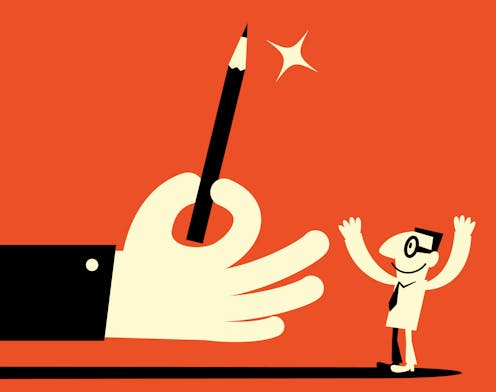Children, like adults, tend to underestimate how welcome their random acts of kindness will be
- Written by Margaret Echelbarger, Assistant Professor of Marketing, Stony Brook University (The State University of New York)

The Research Brief[1] is a short take about interesting academic work.
The big idea
From expressing gratitude[2] to surprising someone with a mug of hot chocolate[3] on a cold day, adults tend to underestimate how positively others will respond to their random acts of kindness[4]. I’m a behavioral scientist[5] who teamed up with my research partner Nicholas Epley[6] on research that showed how children and teens share this misunderstanding.
We gave 101 kids who were 4-17 years old and 99 adults who were visiting a museum in Chicago an opportunity to perform a random act of kindness. They received two museum-branded pencils and were told that they could keep both pencils but were encouraged to give one to another visitor.
The people taking part in this stage of our two experiments then completed a survey asking them to predict how big the pencil’s recipient would consider this act of kindness to be, how positive or negative that person would say they felt afterward, and how good or bad the act of giving the pencil away made them feel.
Meanwhile, and out of sight of the people who gave pencils away, the people who received them – or a parent or legal guardian if they were kids – were approached by a researcher and told that someone else taking part in the study chose to give them a pencil as a random act of kindness. Those people then said how big that act of kindness was and how receiving it made them feel.
We compared the predictions of the people who gave pencils away with what the people receiving the pencils experienced and found that, like adults, most of the kids participating in the study underestimated the positive impact of their small act of kindness.
As we explained in the Journal of Experimental Psychology[7], we found that the vast majority of the people of all ages said they felt better after giving a pencil to a stranger.
Why it matters
Our findings show that doing good feels good, both for those who do good deeds and those who benefit directly from those actions.
Yet, despite the fact that connecting with others is good for your health[8], the world is experiencing a loneliness epidemic[9] that the COVID-19 pandemic exacerbated[10].
What other research is being done
Our findings contribute to a growing body of research[11] suggesting that people may be reluctant to do good deeds because they don’t realize how welcome these acts of kindness are.
Related research has cast light on the tendency to underestimate just how much others will appreciate many expressions of kindness, such as unexpectedly hearing from a friend[12] or receiving a compliment[13]. People even misunderstand how willing others are to lend a hand[14] with chores like carrying boxes or stepping in to take a picture.
Some evidence even suggests that people want to give more compliments than they usually do[15].
Unlike these other experiments, we were able to show that the tendency to misunderstand how much good their small acts of kindness can do begins early in life. Learning what the social consequences of this failure to appreciate just how big of a deal small acts of kindness are requires more research.
References
- ^ Research Brief (theconversation.com)
- ^ expressing gratitude (doi.org)
- ^ surprising someone with a mug of hot chocolate (doi.org)
- ^ random acts of kindness (doi.org)
- ^ behavioral scientist (scholar.google.com)
- ^ Nicholas Epley (scholar.google.com)
- ^ Journal of Experimental Psychology (doi.org)
- ^ connecting with others is good for your health (newsinhealth.nih.gov)
- ^ loneliness epidemic (doi.org)
- ^ COVID-19 pandemic exacerbated (doi.org)
- ^ growing body of research (doi.org)
- ^ unexpectedly hearing from a friend (doi.org)
- ^ receiving a compliment (doi.org)
- ^ willing others are to lend a hand (doi.org)
- ^ people want to give more compliments than they usually do (doi.org)
Authors: Margaret Echelbarger, Assistant Professor of Marketing, Stony Brook University (The State University of New York)

